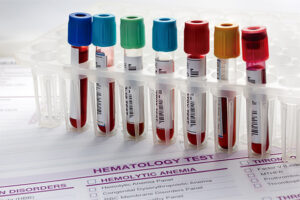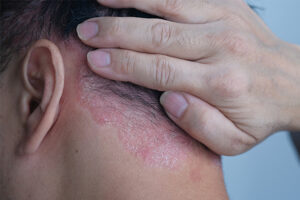Dermatology
Plaque Psoriasis
The Emerging Role of Tyrosine Kinase 2 Inhibition in the Treatment of Plaque Psoriasis
Deucravacitinib is the only TYK2 inhibitor that is currently approved by the US Food and Drug Administration (FDA) for adults with moderate to severe plaque psoriasis. Given its patient-friendly, once-daily oral dosing and its demonstrated safety and greater efficacy than apremilast, it seems to fit into an interim space between other small-molecule inhibitors and the biologics for the treatment of plaque psoriasis.
In terms of its mechanism of action, a TYK2 inhibitor is essentially an IL-12/23 inhibitor, and it also mediates IFN signaling and IFN gamma. It specifically and allosterically blocks TYK2, a member of the JAK family. Its selectivity for TYK2 means that it does not clinically behave like traditional catalytic domain JAK inhibitors such as upadacitinib, abrocitinib, and tofacitinib, which are less specific in their inhibition of JAK family members.
Currently, deucravacitinib is the only TYK2 inhibitor that is FDA approved for adults with moderate to severe plaque psoriasis, although there are others that are in clinical development that may be available in the future. Deucravacitinib is a once-daily oral therapy that has demonstrated safety and efficacy in clinical trials of patients with moderate to severe plaque psoriasis. In 2 phase 3 studies, deucravacitinib significantly improved efficacy (as measured by a ≥75% reduction from baseline in Psoriasis Area and Severity Index at week 16) vs both placebo and apremilast. It was also well tolerated and was found to lack the side effects of nausea, diarrhea, and headache that are commonly experienced with apremilast.
The question of where TYK2 inhibitors will ultimately stand in our treatment armamentarium for patients with plaque psoriasis is complex. We will not have real-world data available for deucravacitinib for 1 to 3 years because of its recent FDA approval. However, given its once-daily oral dosing and its demonstrated safety and greater efficacy than apremilast, some practitioners may prescribe it preferentially over other small-molecule inhibitors and the biologics. So, it seems to fit into a space between these classes of agents. The most obvious patients in whom to consider deucravacitinib are those who prefer oral therapies over injectables. Beyond preference for a daily oral pill, another reason deucravacitinib will likely be appealing to both patients and physicians is that it is a relatively easier drug to use, as most patients will not require routine laboratory monitoring.
Deucravacitinib is a unique molecule with a unique mechanism of action. It—and other emerging TYK2 inhibitors—will likely have a role across multiple domains in the treatment of plaque psoriasis. I believe that it will likely become an important part of our treatment armamentarium for patients with plaque psoriasis.
Armstrong AW, Gooderham M, Warren RB, et al. Deucravacitinib versus placebo and apremilast in moderate to severe plaque psoriasis: efficacy and safety results from the 52-week, randomized, double-blinded, placebo-controlled phase 3 POETYK PSO-1 trial. J Am Acad Dermatol. 2023;88(1):29-39. doi:10.1016/j.jaad.2022.07.002
Martin G. Novel therapies in plaque psoriasis: a review of tyrosine kinase 2 inhibitors. Dermatol Ther (Heidelb). 2023;13(2):417-435. doi:10.1007/s13555-022-00878-9
Potestio L, Ruggiero A, Fabbrocini G, Martora F, Megna M. Effectiveness and safety of deucravacitinib for the management of psoriasis: a review of the current literature. Psoriasis (Auckl). 2023;13:19-26. doi:10.2147/ptt.S407647
Samuel C, Cornman H, Kambala A, Kwatra SG. A review on the safety of using JAK inhibitors in dermatology: clinical and laboratory monitoring. Dermatol Ther (Heidelb). 2023;13(3):729-749. doi:10.1007/s13555-023-00892-5
Strober B, Thaçi D, Sofen H, et al. Deucravacitinib versus placebo and apremilast in moderate to severe plaque psoriasis: efficacy and safety results from the 52-week, randomized, double-blinded, phase 3 Program fOr Evaluation of TYK2 inhibitor psoriasis second trial. J Am Acad Dermatol. 2023;88(1):40-51. doi:10.1016/j.jaad.2022.08.061
Yang F, Lu C, Wang Y, Liu H, Leng X, Zeng X. Efficacy and safety of Janus kinase inhibitors in patients with psoriasis and psoriatic arthritis: a systematic review and meta-analysis. Clin Rheumatol. 2023;42(6):1593-1605. doi:10.1007/s10067-023-06529-4
Yuan S, Wang L, Zhang H, et al. Mendelian randomization and clinical trial evidence supports TYK2 inhibition as a therapeutic target for autoimmune diseases. EBioMedicine. 2023;89:104488. doi:10.1016/j.ebiom.2023.104488











